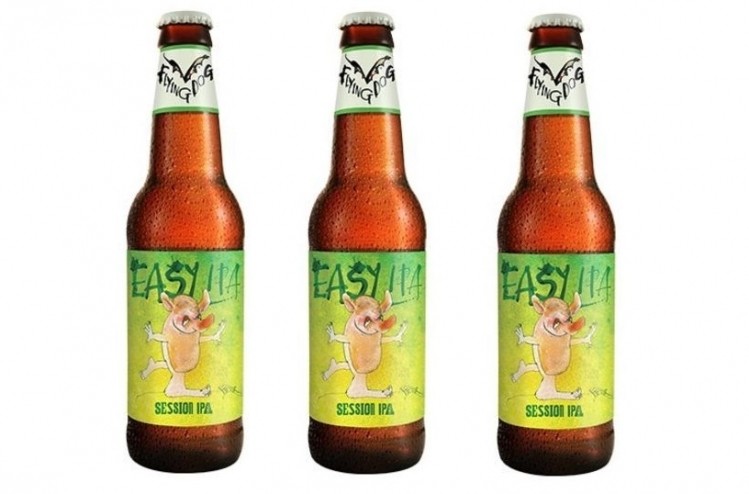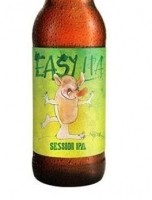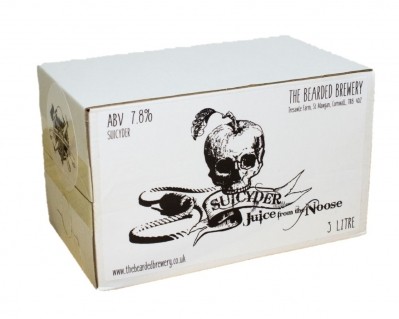‘This is about a US craft brewery standing up against some of the largest drinks producers in the UK’
Flying Dog Brewery stands by artwork that watchdog claims ‘encourages irresponsible consumption’

The beer features original art by Welsh artist Ralph Steadman, an artist known for his work with journalist Hunter S. Thompson, who has been designing distinctive art for the brewer since 1995.
The Portman Group – a group founded to promote responsible alcohol standards and funded by eight alcohol industry members including AB InBev, Carlsberg, Heineken and Molson Coors - is due to issue a Retailer Alert Bulletin next week: asking UK retailers not the place orders for the beer.
But Flying Dog says it will continue to distribute Easy IPA in the UK: ‘taking a stand’ for free speech and creative expression.
Flying Dog: 'defending creative expression'
Flying Dog Brewery’s Easy IPA is imported into the UK by wholesaler and distributor James Clay, which is not a signatory of the Portman Group.
Following one complaint that the beer could be mistaken for a soft drink (which was dismissed), the Portman Group did however decide that the packaging artwork "…directly or indirectly encourages illegal, irresponsible or immoderate consumption, such as binge drinking, drunkenness or drunk-driving."
It will be issuing a Retailer Alert Bulletin on 15 October, asking retailers not to place orders for the beer.
But Flying Dog, which is based in Maryland, says it will take its mission to ‘defend free speech and creative expression’ in the US into the UK.
Jim Caruso, Flying Dog CEO and co-founder of the nonprofit 1st Amendment Society, said: "Without question, over-consumption, binge drinking and drunk-driving are serious health and public safety issues, and Flying Dog has always advocated for moderation and responsible social drinking.
“At the same time, there is no evidence to suggest that the whimsical Ralph Steadman art on the Easy IPA label causes any of those problems. We believe that British adults can think for themselves and Flying Dog, an independent US craft brewer, will not honor the Portman Group's request to discontinue shipping Easy IPA to the UK.
"This is about good beer, and a relatively small, artisanal US craft brewery standing up against a consortium of some of the largest drinks producers in the UK."
The label
In its ruling, the Portman Group's panel said: "While it was not immediately apparent what the character was, the Panel noted that the figure appeared to be balancing on one leg whilst walking a line which, when considered in the context of an alcoholic product, looked akin to someone balancing along a line to demonstrate sobriety.
"The Panel noted the company’s response to this point; that the line was there to provide perspective and nothing more.
"The Panel also noted the company’s explanation that it was not the character’s eyes that were red, but its eyelids. The Panel considered the illustration in this context. It noted that the characters eyelids were red, and it had a red nose which emphasised the intoxicated nature of the character.
"The Panel considered the image in context alongside the phrases ‘Easy IPA’ and ‘Session IPA’. While the terms Easy IPA and Session IPA were not in and of themselves problematic, the Panel was concerned that, when considered alongside the image the product could be seen as encouraging drunkenness."
Flying Dog Brewery founded the 1st Amendment Society in 2016, using the damages it received from a ruling that the Michigan Liquor Control Commission’s ban of the beer ‘Raging Bitch’ in Wolverine State violated the brewery’s First Amendment rights.
Last year it terminated its membership with the Brewers Association, the US association for craft brewers, over free speech concerns when the BA cracked down on ‘sexually explicit, lewd, or demeaning brand names, language, text, graphics, photos, video or other images'.
Index on Censorship, a UK-based freedom of expression organization that campaigns against censorship worldwide and which used a Ralph Steadman illustration on the cover of a 2000 magazine - says it supports Flying Dog’s stance on its Steadman artwork.
"Flying Dog has been a supporter of Index on Censorship for several years and we're pleased they're standing up to this decision," Index on Censorship chief executive Jodie Ginsberg said. "We need to treat adults like the grown-ups they are."
The Portman Group
Its role is to a) lead on best practice in alcohol social responsibility; b) regulate the promotion and packaging of alcoholic drinks sold or marketed in the UK through a Code of Practice; c) challenge and encourage the industry to market its products responsibly.
It is a not-for-profit organisation funded by eight member companies: AB InBev, Bacardi Brown-Forman Brands; Carlsberg; Diageo; Heineken; MolsonCoors; Pernod Ricard UK; and Jagermeister.
Complaints are considered by the Independent Complaints Panel. Panel member must not be employed by the Portman Group or any of its member companies.
Creativity - where are the boundaries?
Flying Dog is not the only brewery to have its packaging questioned over soft drink cues.
Last year Welsh brewery Tiny Rebel Brewing Company amended the design of its Cwtch Welsh Red Ale cans after the Portman Group deemed the graffiti style graphics, bold colours, and picture of a bear could appeal to children.
Tiny Rebel has changed its cans: but said the process took five months of work, nearly £30,000 ($40,000) in costs, and ‘a fair bit of stress’.
It warned at the time that such rulings could hamper creativity for the whole industry: ‘It forces companies to be over-cautious in design, which is inherently limiting. Instead of designing something for what consumers would like, companies have to design bearing what the most prudish among us wouldn’t like.”





